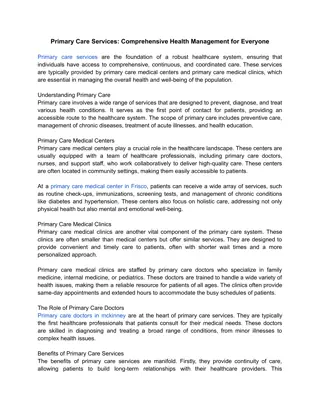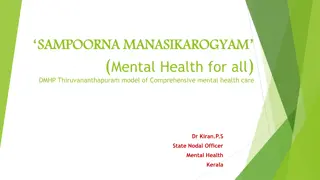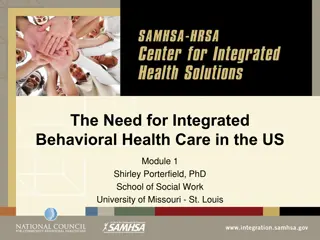The Role of Mental Health Practitioners in Primary Care
GPs and primary care play a pivotal role in addressing mental health challenges, yet the focus on primary care in mental health is often overlooked. From early prevention to empowering individuals, primary care can offer effective support through holistic approaches, social interventions, and linking to community resources. Embracing social prescribing, valuing social support, and empowering individuals are key aspects of enhancing mental health services in primary care.
Download Presentation

Please find below an Image/Link to download the presentation.
The content on the website is provided AS IS for your information and personal use only. It may not be sold, licensed, or shared on other websites without obtaining consent from the author. Download presentation by click this link. If you encounter any issues during the download, it is possible that the publisher has removed the file from their server.
E N D
Presentation Transcript
Mental Health Practitioner Role in Primary Care Vicki Jordan Mental Health Practitioner/Independent Prescriber Primary Care Clinical Advisor (Mental Health)
GPs and primary care are the first port of call for many people experiencing poor mental health. Most people with mental health conditions in England do not have contact with specialist mental health services. Mental Health in Primary Care This challenge has not gone unrecognised and yet the role of primary care in mental health has rarely been the focus for policy development or attracted the same level of attention as specialist mental health services in England. This means that the mental health support that people are offered in primary care will depend on local developments and the interest and commitment of local GPs and colleagues to strengthen the mental health offer. Primary care is uniquely positioned as a frontline universal service to provide an effective and early response to people experiencing poor mental health and to play a critical role in prevention.
The Role of Primary Care
1. Identifying the opportunities for prevention and the promotion of positive mental health Providing information and resources to enable people to manage their mental health including community assets. 2. Maximising social interventions for mental health Moving away from prescriptions for antidepressants and psychological therapy as the only solutions to common mental health problems; Building awareness of community resources that GPs seldom know about, through link worker or navigator roles; How Do We Strengthen the Mental Health Offer? Embracing social prescribing as an opportunity to bring together community resources and maximise social interventions; Linking to voluntary sector initiatives focused on promoting mental wellbeing and providing crisis support. 3. Culture change embracing the holistic approach Valuing social support that is not necessarily labelled as mental health care covering multiple dimensions e.g. social contact, employment/vocational support, housing, benefits, debt advice, exercise, healthy eating, alcohol management, sleep etc; Linking to physical health initiatives e.g. smoking cessation, long term conditions, integrated care pilots; 4. Empowering the person moving from patient to person Enabling people to make their own decisions about what they need to focus on in their life whole life mapping, recovery college style approach; Identifying clear routes into support to address social factors and the causes of their mental health problems domestic violence, sexual abuse, debt, housing, welfare benefits; Valuing social contact, volunteering, hobbies and employment.
Summary Of Mental Health Practitioner Role
How Does It Fit In? How Does It Fit In? Primary Care Secondary Secondary Care Care Service for All Common Mental health problems that can be self- managed or with minimal input i.e. IAPT, 3rd sector organisation input. Severe & Complex Mental Health requiring multidisciplinary approach and care co- ordination. Mental Health Practitioner/ Navigator
What Can an MHP Potentially Do?
How it is Working in Practice























